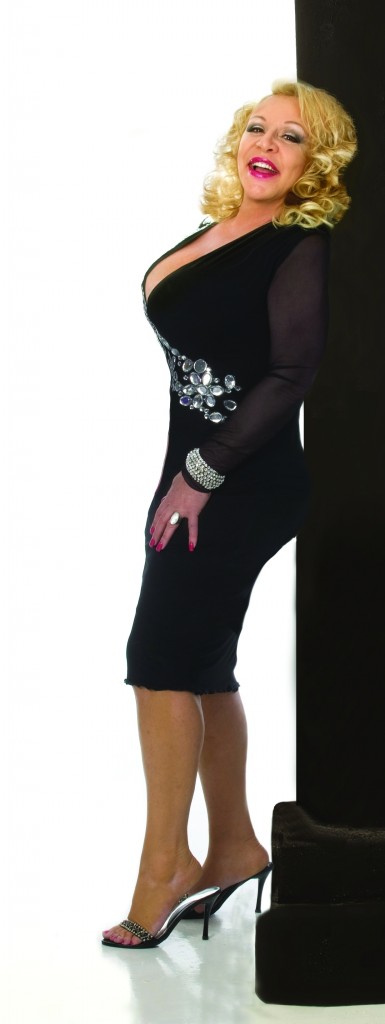By GREGG SHAPIRO
Queer singer/songwriter Nona Hendryx has had the kind of career longevity (and variety) of which many musicians can only dream or hope to achieve. Best known as one-third of the groundbreaking soul/rock trio LaBelle—who rocketed to fame with their massive hit “Lady Marmalade,” and performed with the prolific Laura Nyro—the uncompromising Hendryx has had an unconventional solo career, daring to go in musical directions (which included performing with Bill Laswell’s Material, and providing backup vocals for David Byrne’s Talking Heads) that few others would ever consider. Her latest album, “Mutatis Mutandis” (Righteous Babe), was released last month. Hendryx spoke with Florida Agenda’s Gregg Shapiro.
FA: Of the nine songs that you wrote or co-wrote on “Mutatis Mutandis,” were any of them written or conceived of during the LaBelle reunion period, and 2008’s “Back to Now”?
NH: Those songs came out of me over a period of time since 9/11. I’ve written many songs since then, but these are a group of songs that live together—the most recent being “Mad As Hell.” I was in the process of writing three additional songs that I didn’t really have time to complete, which will become another project.
FA: With songs such as “Tea Party,” and “The Ballad of Rush Limbaugh,” and “Mad As Hell,” not to mention your cover of “Strange Fruit,” would it be fair to say that “Mutatis Mutandis” is one of your most political recordings?
NH: Yes, I would say it’s the most, as a set of songs. We were always [political] as LaBelle, and within my solo career, there’ve been social statements, some political, but more dealing with social thoughts and feelings and expressions. This is much more pointedly political.
FA: You make reference to the Second Amendment, and the right to bear arms, in “Tea Party.” The tragedy in Aurora, Colorado [is] another example of senseless gun violence. What are your thoughts?
NH: Only how sad it is. This has been an ongoing problem, and I think we can look to European countries, and learn a strong lesson about gun control. We are just more prone to that type of violence because of how we have accepted weaponry, since the birth of our country. I parallel that with the desire to legislate a woman’s body. One gives birth, one gives life. One takes life. And you want to legislate one, but not the other. I don’t understand it. My brain can’t compute that.
FA: Grammy-winning lesbian jazz drummer Terri Lyne Carrington performs on the song “Let’s Give Love A Try,” and you can be heard singing on Carrington’s rendition of your song “Transformation,” on her “Mosaic Project” album. What did it mean to have that song covered by another performer?
NH: It’s not the first time. It’s the same, but different. Terri is really talented, and she has this great ability to take something like “Transformation,” which is a funkpop groove, written by me and Carole Pope and Kevin Staples, two Canadians [of the band Rough Trade]. And she gave it another life, in terms of the horn and piano parts. I think it’s beautiful. I really love it.
FA: Amidst all the anger and frustration on the disc, love offers hope on songs such as “Let’s Give Love A Try,” and “When Love Goes to War.” Do you think love stands a chance in these times?
NH: [Laughing] Love always stands a chance. They say, “perennial as the grass, it will bloom.” As long as there are young and old hearts, people who’ve been jaded or crushed or hurt by life’s experiences, that is the thing that powers our getting up every day and walking through the pain and the difficulties that are part of the human experience.
FA: Nine of the 10 songs on the disc are original compositions. Why did you choose to cover “Strange Fruit?”
NH: I’ve been moved by that song for I don’t know how many years. I found it difficult to get to, to interpret—to feel that I could actually do it justice in any way. It was so owned by Billie Holiday. It had to do with that time when there were noose hangings in different places in America—in the South and in the Northeast. It brought back that vivid image. [In 1998, Matthew Shepard] was left hanging on a fence, he was killed. And [with] the rise of the Tea Party and other things, it just felt like that kind of thing could happen again. It felt so palpable that that kind of energy was on the rise in America. I went into my studio one day and made my version of the song, to try and get out of me feelings that came up.
FA: Do you have a Broadway musical in you?
NH: [Laughs] I have a musical, but it may not be Broadway. It’s based on my “Skin Diver” album. I’ve been working on that with Charles Randolph- Wright, who is at the moment preparing the Broadway musical of “The Berry Gordy Story.” Charles and I have been working together for quite some time. We worked on plays with music called “Blue” and “Oak and Ivy,” that were performed at Arena Stage [in Washington D.C.]. We’ve done quite a few things together. And “Skin Diver” has been our long awaited baby that we’re birthing [laughs].
FA: When your tour does come to town, what can your fans and friends expect?
NH: High energy, [and a] funky, rocking performance, where your head is nourished, and your soul is nourished, and your booty is shaking.










